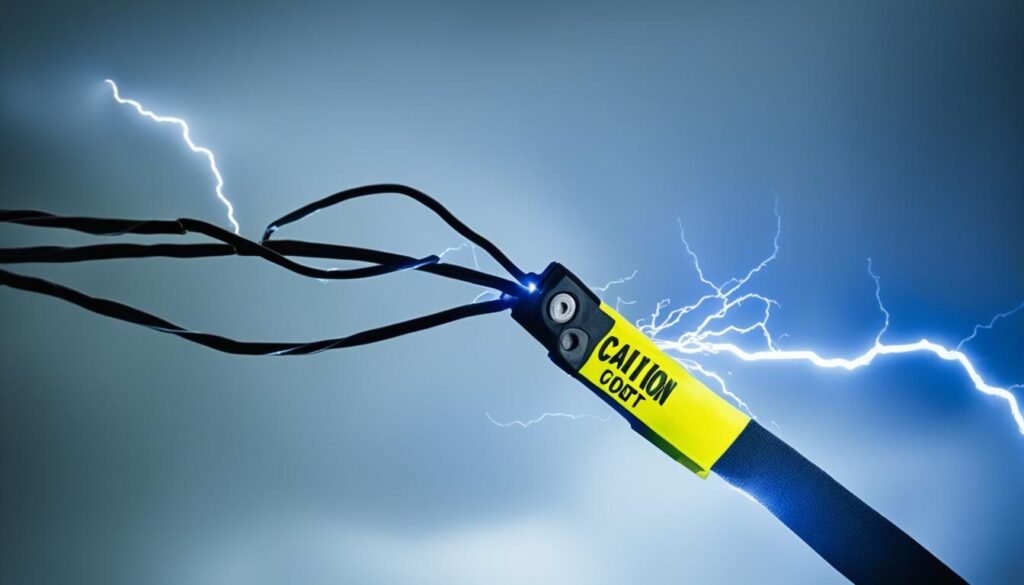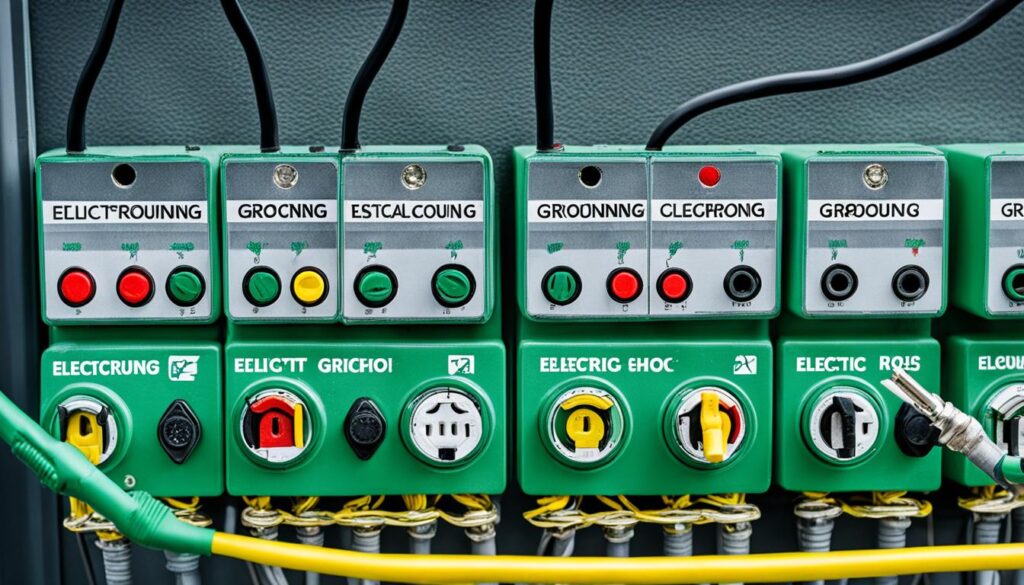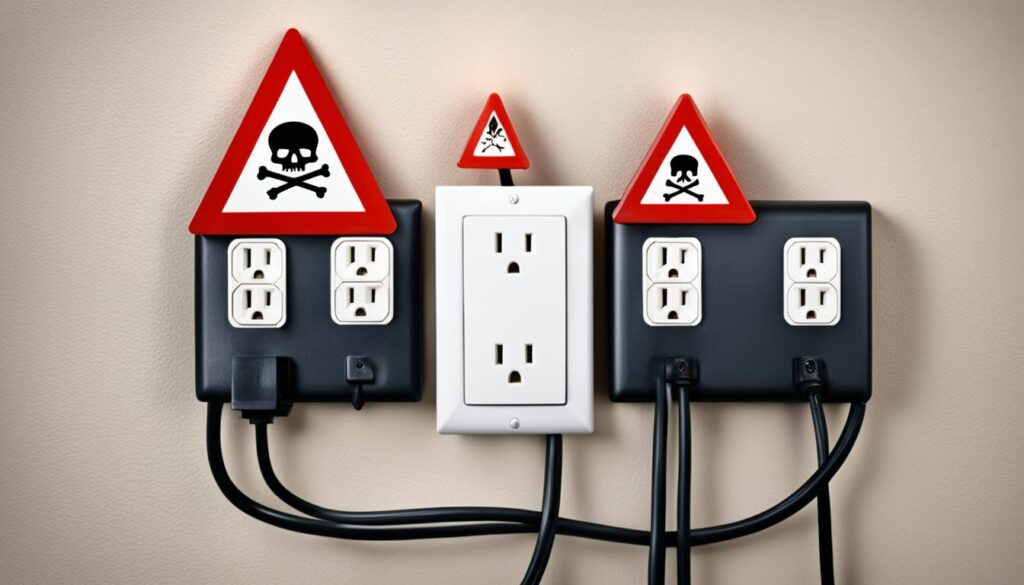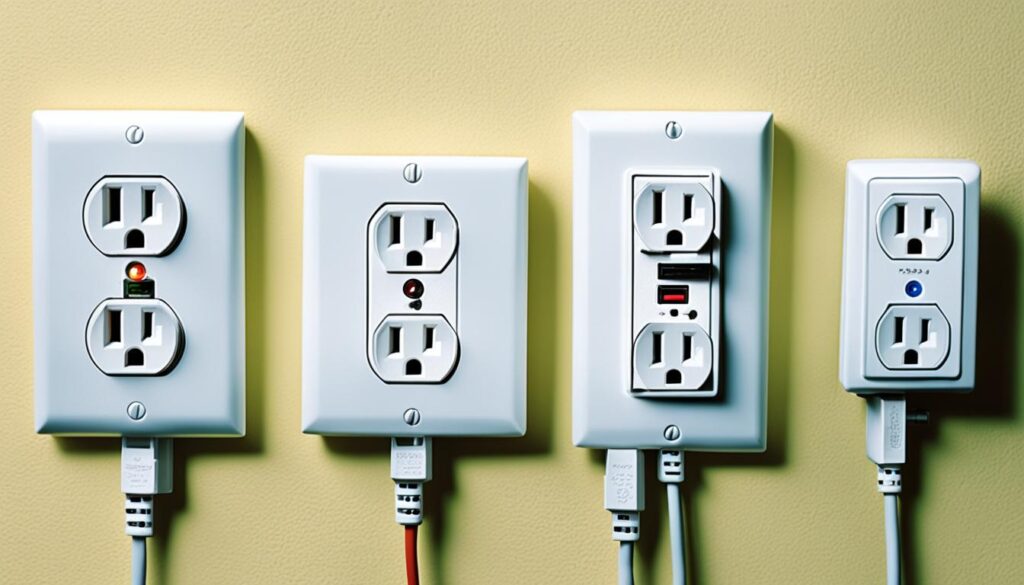Electrical safety is crucial for maintaining a secure and hazard-free home environment. By following these outlet electric safety tips and best practices, you can minimize the risks associated with electricity and protect yourself and your property from potential hazards.
When it comes to outlet installation, repair, replacement, or wiring, it is essential to prioritize safety to prevent electrical accidents. Additionally, staying updated with the latest advancements in outlet technology, such as GFCI outlets, USB outlets, and smart outlets, can further enhance electrical safety in your home.
Key Takeaways:
- Ensure timely installation and repair of electrical outlets to prevent hazards.
- Stay informed about the latest outlet technologies, such as GFCI, USB, and smart outlets.
- Follow proper wiring practices to avoid potential electrical problems.
- Regularly inspect and maintain outlets in your home.
- Consult professionals for complex outlet installations or repairs.
10 Electrical Safety Rules
When it comes to electrical safety, following the right rules and guidelines is paramount. By prioritizing safety and implementing these important rules, you can ensure the well-being of yourself and your property. Take note of the following 10 electrical safety rules:
- Handle electrical equipment with care: Always treat electrical equipment with caution and avoid using damaged or faulty devices.
- Avoid water and electricity: Keep electrical equipment away from water sources to prevent electrocution. Water is a conductor of electricity, posing a serious safety risk.
- Install Ground Fault Circuit Interrupters (GFCIs): GFCIs are crucial in areas where water and electricity are in close proximity, such as kitchens and bathrooms. They provide protection against electrical shocks.
- Unplug equipment safely: When unplugging electrical devices, avoid pulling the cord. Instead, grip the plug firmly and pull it out gently to prevent damage to the cord and potential electrical hazards.
- Keep cords organized: Install tidy electrical cords and avoid using damaged or frayed cords. Organizing cords helps prevent tripping hazards and reduces the risk of electrical accidents.
- Never overload outlets: Overloading outlets can lead to overheating, electrical fires, and equipment damage. Use extension cords or power strips with caution and ensure they are not overloaded.
- Use childproof outlets: If you have young children at home, install childproof outlets to prevent accidental contact with electrical sockets.
- Follow manufacturer’s instructions: Always read and follow the manufacturer’s instructions for electrical equipment installation and usage to ensure safety.
- Regularly inspect electrical equipment: Conduct routine inspections of electrical equipment to identify any signs of damage, such as frayed wires or loose connections. Promptly repair or replace any faulty equipment.
- Consult a professional: For major electrical repairs or installations, it is essential to consult a licensed electrician who can ensure safety and compliance with electrical codes.
By incorporating these electrical safety rules into your daily routine, you can safeguard yourself, your loved ones, and your property from potential electrical hazards.

Guides for Electrical Installation Safety
When it comes to electrical installations, safety should always be the top priority. Thankfully, there are comprehensive guides provided by electrical safety organizations that offer valuable information and instructions to ensure safe electrical installations. These guides cover a wide range of topics related to electrical safety standards and best practices. Here are some key areas covered in these guides:
- Electrical Installation Safety: The guides emphasize the importance of following electrical installation safety protocols to prevent accidents and maintain a secure electrical system.
- Consumer Unit Replacement: Proper guidance is provided for replacing consumer units, which are an essential component of the electrical system.
- Safe Isolation Procedures: The guides provide step-by-step instructions on how to safely isolate electrical circuits during installation or maintenance work.
- Microgeneration System: Information is given on the safe installation and operation of microgeneration systems, such as solar panels and wind turbines.
- Electrical Installation Condition Reporting: The guides cover the process of conducting electrical installation condition reports to assess and identify potential risks or issues.
- Electrical Safety Standards: Detailed explanations are provided on the current electrical safety standards that should be followed for new installations, renovations, or repairs.
By referring to these guides and following the recommended procedures, homeowners and professionals can ensure that electrical installations are carried out safely and in compliance with established standards. Prioritizing electrical installation safety is crucial for maintaining a secure and reliable electrical system in any building.
Image Placeholder: Electrical Installation Safety
Below is an illustrative image related to electrical installation safety:

| Topic | Description |
|---|---|
| Electrical Installation Safety | Guidelines to ensure safe electrical installations |
| Consumer Unit Replacement | Procedures for replacing consumer units |
| Safe Isolation Procedures | Step-by-step instructions for safe isolation of electrical circuits |
| Microgeneration System | Safe installation and operation of microgeneration systems |
| Electrical Installation Condition Reporting | Conducting reports to assess electrical installation conditions |
| Electrical Safety Standards | Compliance with current electrical safety standards |
Common Dangers of Electricity
Understanding the common dangers associated with electricity is crucial for maintaining electrical safety. By being aware of these hazards, you can take proactive measures to prevent accidents and protect yourself and your property. Here are some key dangers to watch out for:
- Electrical Dangers: Electric shocks can occur when there is contact with live electrical currents. It’s important to never touch exposed wires or electrical equipment without proper insulation and protection. Additionally, power surges can damage electronic devices and appliances, leading to potential fire hazards.
- Faulty Wiring: Faulty wiring poses a significant risk in homes. Old or damaged wiring can cause electrical fires or malfunctioning electrical appliances. Regular inspections and maintenance of wiring systems are essential to identify and mitigate any potential risks.
- Water and Electricity: Water and electricity are a dangerous combination that can lead to electric shocks or electrocution. Always ensure that electrical outlets, appliances, and cords are kept away from water sources, and never handle electrical equipment with wet hands or in wet conditions.
- Overloaded Sockets: Plugging too many devices into a single socket can overload the electrical circuit, leading to overheating and potential fires. Use power strips and surge protectors to distribute the load evenly and avoid the temptation to use multiple adapters in one outlet.
Remember:
“Electrical safety starts with awareness and responsible practices. By understanding the dangers and taking precautions, we can create a safer environment for ourselves and our loved ones.” – Electric Safety Association

Being knowledgeable about the common dangers of electricity empowers you to prioritize electrical safety. By implementing preventive measures such as regular electrical inspections, proper maintenance of wiring systems, and safe usage of electrical equipment, you can significantly reduce the risk of accidents and protect your home and family from potential hazards.
Electrical Safety Tips for Homes and Families
Maintaining electrical safety in homes and families is essential to ensure the well-being of everyone and safeguard against potential hazards. By following these electrical safety tips, you can create a secure environment for you and your loved ones.
1. Childproof Outlets
Safeguard your children from electrical accidents by childproofing all outlets in your home. Install childproof outlet covers or tamper-resistant outlets to prevent curious little fingers from coming into contact with electrical sockets.
2. Proper Appliance Usage
Use electrical appliances responsibly and according to their intended purpose. Avoid overloading outlets by plugging in multiple high-wattage appliances simultaneously. Follow the manufacturer’s guidelines for proper usage and maintenance of each appliance to reduce the risk of malfunctions.
3. Extension Cord Precautions
When using extension cords, exercise caution to prevent electrical hazards. Use cords that are in good condition and have the appropriate ampere rating for the devices connected. Never overload an extension cord or run it under rugs or carpets where it can be damaged.
4. Regular Inspections
Regularly inspect your home’s electrical system for any signs of wear and tear, such as frayed wires or loose connections. Pay attention to flickering lights, sparking outlets, or frequently tripping circuit breakers, as these can indicate underlying electrical issues that require professional attention.
5. Grounding
Ensure that all electrical outlets, appliances, and equipment are properly grounded. Grounding provides a path for electrical currents to safely dissipate and prevents the buildup of excessive voltages. Consult a qualified electrician to ensure proper grounding in your home.
“Electrical safety is a top priority for families. Implementing these tips can significantly reduce the risk of electrical accidents and ensure a safe living environment for you and your loved ones.” – Electrical Safety Organization
| Electrical Safety Tips | Description |
|---|---|
| Childproof Outlets | Install tamper-resistant outlet covers to protect children from electrical hazards. |
| Proper Appliance Usage | Follow manufacturer instructions for correct appliance usage to prevent malfunctions. |
| Extension Cord Precautions | Use appropriate extension cords and avoid overloading or damaging them. |
| Regular Inspections | Regularly inspect your home’s electrical system for signs of wear and tear. |
| Grounding | Ensure proper grounding of outlets, appliances, and equipment. |
Remember, electricity can be dangerous if not handled correctly. Implementing these electrical safety tips in your home can help prevent accidents and create a secure environment for your family. Stay vigilant and prioritize electrical safety.

Conclusion
Electrical safety is of utmost importance in any household as it helps prevent accidents, injuries, and property damage. By following the recommended safety tips and best practices, individuals can minimize the risks associated with electricity and create a safer living environment. Whether it’s properly installing and maintaining electrical equipment, childproofing outlets, or adhering to guidelines for electrical installations, each step contributes to overall safety.
Prioritizing electrical safety and staying informed about potential hazards are crucial for preventing electrical hazards. Regular consultations with professionals for any electrical issues and ongoing education about electrical safety practices can greatly contribute to a hazard-free life for you and your family. Remember, the importance of electrical safety cannot be overstated.
By adopting electrical safety practices and implementing preventive measures, individuals can ensure their homes and families are protected from electrical hazards. It is essential to recognize the significance of electrical safety and take the necessary steps to prevent accidents. Always prioritize safety and consult professionals for any electrical concerns to create a secure living environment.

